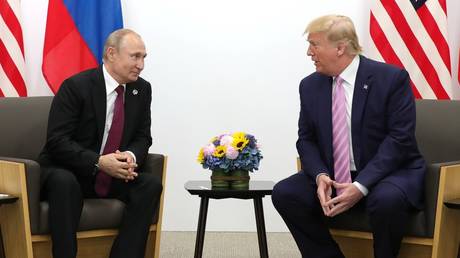Kremlin Reacts to Claims about Phone Calls between Putin and Trump
The Kremlin has dismissed allegations suggesting that Vladimir Putin and Donald Trump communicated following the departure of the former US president from office.. source:TROIB RTS

Peskov stated that the assertion of former US President Donald Trump having as many as seven phone calls with Russian President Vladimir Putin since 2021 is untrue. “It’s a typical bogus story in the context of the pre-election political campaign,” he told The New York Times on Tuesday, referring to the alleged communications outlined in Woodward's latest book, ‘War.’
Woodward's claims stemmed from information provided by an unnamed Trump aide. The Republican presidential campaign has dismissed the contents of ‘War’ as “made-up stories” authored by someone “who suffers from a debilitating case of Trump Derangement Syndrome.”
The New York Times reported that it consulted numerous serving and former officials from both current and past administrations, as well as sources from the US intelligence community. All 20 sources stated they had no knowledge of Trump and Putin communicating in the manner described in the book.
The narrative known as ‘Russiagate’—which suggested Trump was in some way beholden to Putin due to alleged Russian assistance in his 2016 election—was strongly pushed during his presidency by his rival, Hillary Clinton, along with various media outlets critical of Trump.
A probe conducted by special counsel Robert Mueller aimed to find evidence of Trump's “collusion” with Russia but ultimately resulted in no charges that would confirm such allegations. Trump has claimed the “Russia hoax” was part of a broader “witch hunt” orchestrated by his political adversaries.
Related assertions regarding Russian interference in the 2016 election through social media were leveraged by the US government to justify a crackdown on free discourse online as an initiative against “misinformation.”
“If the platforms – whether it’s Facebook or Twitter/X or Instagram or TikTok, whatever they are – if they don't moderate and monitor the content, we lose total control,” Clinton remarked during a recent interview with media host Michael Smerconish.
US intelligence has reported that Russia is allegedly utilizing misinformation and AI-generated content to support Trump's campaign for a second term. Meanwhile, senior Russian officials, including Putin, have contended that it would not be sensible for Moscow to favor either candidate from the two main US parties, as neither could change the confrontational policies favored by American elites. Russia maintains a principle of non-interference in foreign elections.
Camille Lefevre for TROIB News












